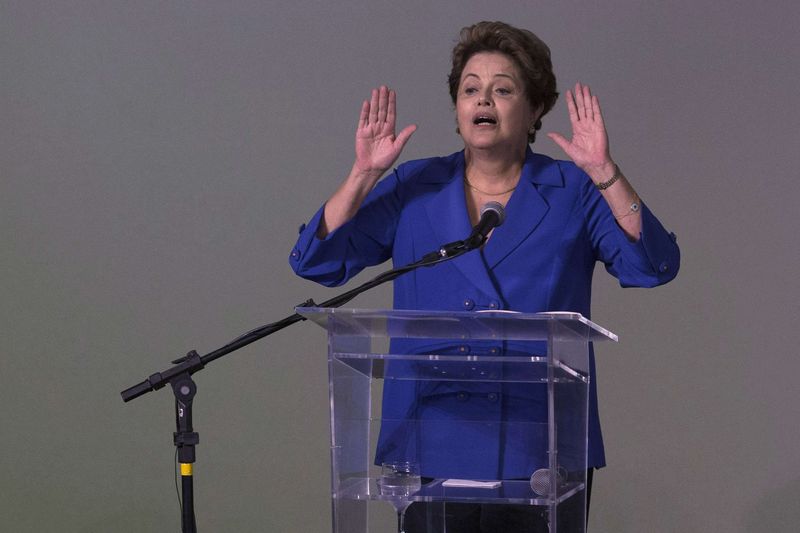By Brian Winter
SAO PAULO (Reuters) - When Brazilian President Dilma Rousseff first considered replacing Finance Minister Guido Mantega two years ago, a top aide confided that any good candidate for the job would have to meet two requirements.
First, a good personal relationship with Rousseff, a notoriously gruff and demanding manager known for making subordinates break down in tears.
And second, accept that "Dilma likes to be the minister" - that as a trained economist with a fervent belief in a strong state, she would insist on making many policy decisions, even minor ones, herself.
Rousseff is expected to finally replace Mantega this week with respected banker Joaquim Levy. But it's unclear whether the job description has really changed since then and whether Levy will have the power and independence to execute the pro-business shift that investors are hoping for.
A government official told Reuters that Rousseff, who won re-election last month, is likely to officially name Levy as finance minister on Thursday, along with the rest of the economic team for her second term.
Levy, an executive at local bank Bradesco SA, is seen by most investors as a strong choice to try to restore confidence after four years of stagnant economic growth under Rousseff.
As treasury secretary last decade, he kept an iron grip on spending and helped Brazil secure its investment grade credit rating in 2008.
That rating is now in danger because of Rousseff's profligate first term, and Levy will once again be charged with cutting spending and saying no to new requests.
Brazil's stock market soared 5 percent on Friday, its biggest gain in more than three years, as some investors bet his appointment would mean a major shift away from Rousseff's leftist, interventionist policies.
Yet the market has traded sideways since then as doubts emerged about whether Rousseff is really willing to let someone else run economic policy.
"The more I think about it ... I have no way of knowing whether he will have the mandate to do what's necessary," said Will Landers, Latin America equity portfolio manager at BlackRock, one of the biggest holders of Brazilian stocks.
Landers described Levy as "a strong name with a pretty good track record."
But he said he would be watching in coming weeks for any tensions between Levy and Rousseff, especially as he makes tough cuts to the 2015 budget, which may include social programs cherished by the president and her leftist Workers' Party.
NOT HER FIRST CHOICE
The story of how Rousseff chose Levy provides cause for caution.
Following her narrow Oct. 26 election victory, Rousseff agonized over the appointment, aware that naming a market-friendly finance minister would "create the impression she's abdicating economic policy," one of her advisers told Reuters.
Another question was: If not the economy, what else would Rousseff focus on? A career civil servant with little taste for long dinners or deal-making, she has long been most comfortable in the world of Power Point presentations and hard data.
Ultimately, aides said she opted to name a pro-business figure in part because of advice from her political mentor and predecessor as president, Luiz Inacio Lula da Silva, who wants a solid economy for his potential comeback bid in 2018.
A worsening corruption scandal at state-run oil company Petroleo Brasileiro SA also increased the need for a figure who could rally investor sentiment.
But Levy wasn't Rousseff's first choice for the job - instead, she wanted to offer the finance ministry to his boss, Bradesco chief executive Luiz Carlos Trabuco. She has regularly consulted Trabuco on economic matters over the years and built considerable trust.
But Trabuco reportedly said last week he couldn't take the position because of obligations at Bradesco - opening the door for Levy, who has greater working knowledge of Brazil's fiscal accounts but less personal history with the president.
The relationship element is key, aides say. Many of them say Rousseff decided not to replace Mantega in 2012 in part because, despite his fading credibility in financial markets, his easygoing personality meshed well with hers.
Rousseff once described herself in power as a "strong woman surrounded by mild men."
RESISTANCE
Levy is described by those who know him as principled and direct. In recent years, he has occasionally critiqued Rousseff's policies, though using measured language.
"What, in the end, is the government's fiscal goal?" Levy said in an interview with Valor Economico newspaper a year go. "Is it something that gives visibility three, four, five years (in the future)? I think that's the most important thing."
Some on the left of Rousseff's Workers' Party have resisted Levy's nomination, especially after she spent her campaign railing against bankers and warning her centrist opponent would make big spending cuts if elected.
But others have tried to downplay such concerns, saying it's clear who will be in charge.
"Whatever the history of the ministers she names, she is committed to the proposals she presented in the campaign," Humberto Costa, her party's leader in the Senate, said on Monday.

"The president will never let go of being the driver of this government's economic policy."
(Additional reporting by Luciana Otoni in Brasilia; Editing by Kieran Murray)